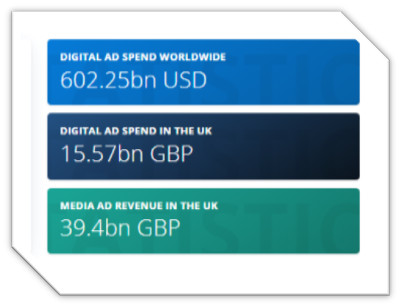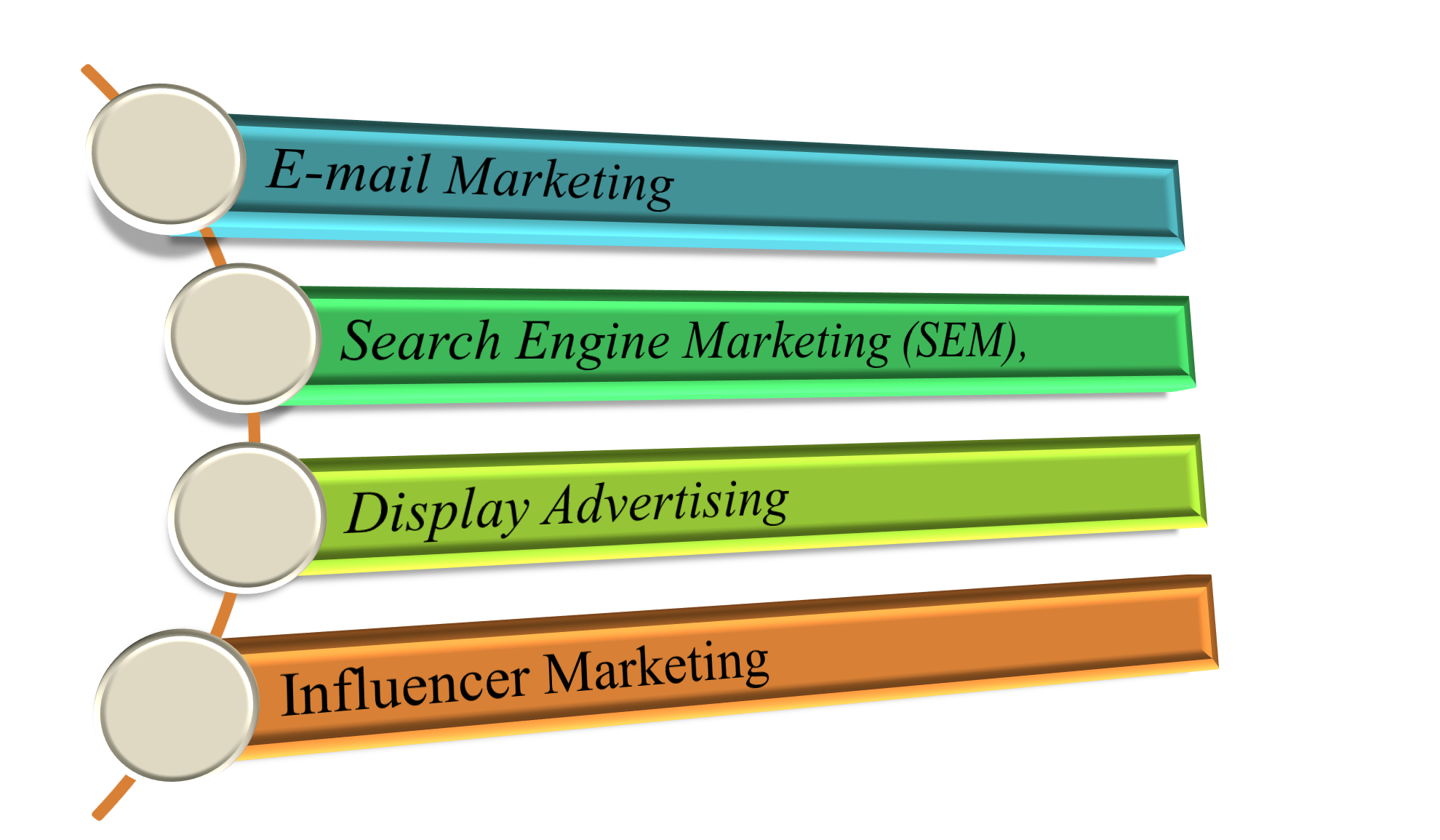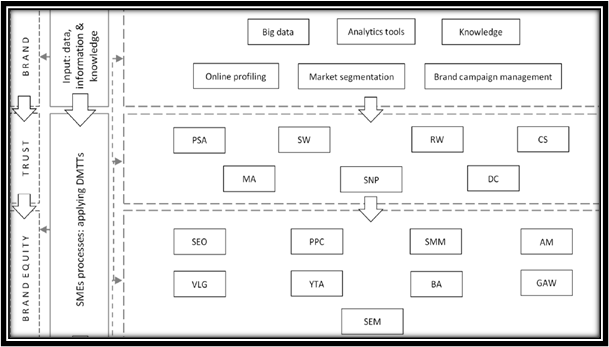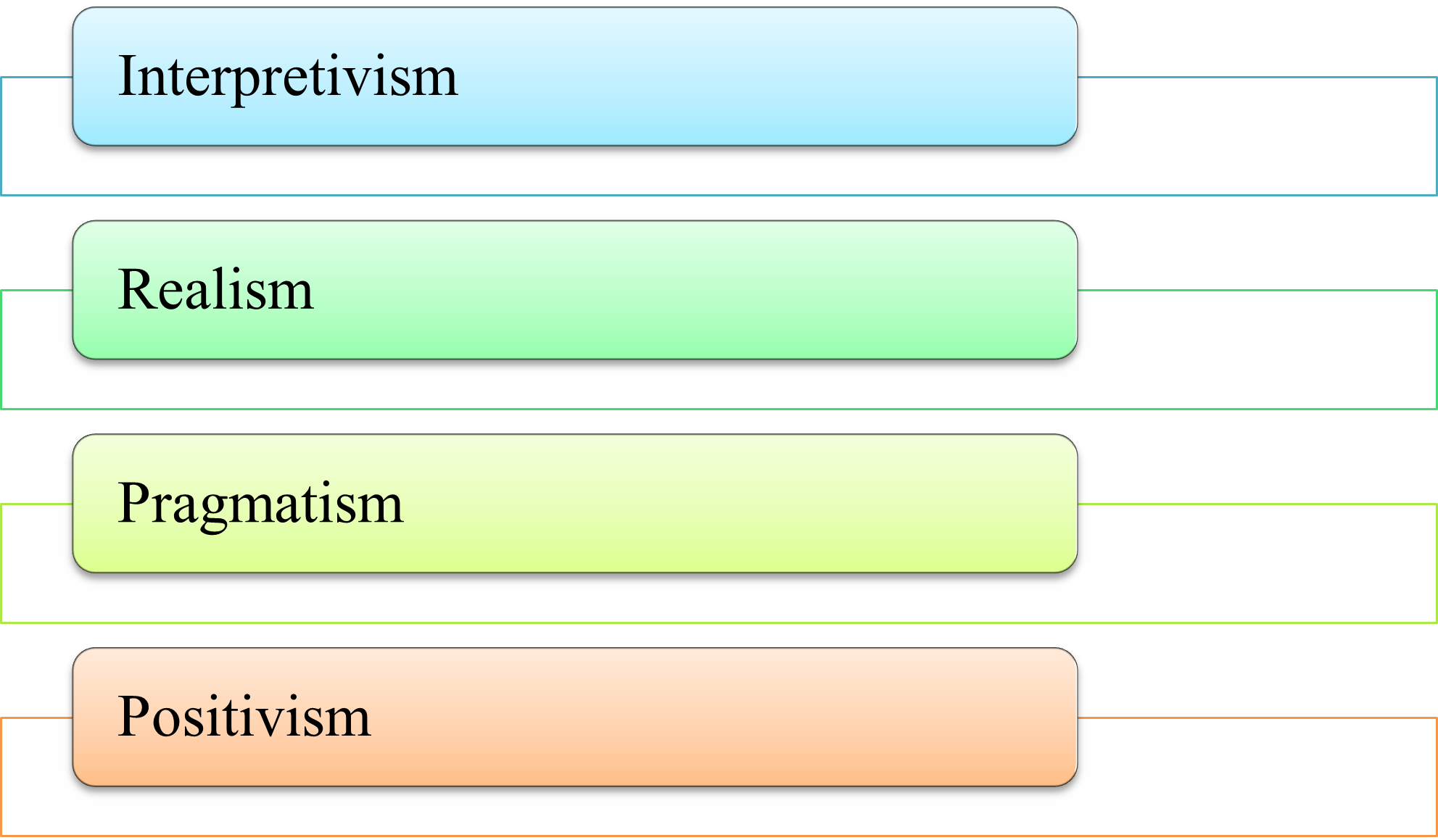PGBM115 International Business Management Dissertation Sample
Module code and Title: PGBM115 International Business Management Dissertation Sample
1.0 Introduction
1.1 Introduction to the study
Digital marketing has become an instrumental factor in business development due to its increased market reach and procedural advantages. Organisations across multiple sectors such as retail, fashion and hospitality are introducing a digital marketing process due to its advantages.
 Figure 1: Digital marketing statistics across the UK (Source: Statista Research Department, 2021)
Figure 1: Digital marketing statistics across the UK (Source: Statista Research Department, 2021)
Figure 1 is providing a detailed analysis of the number of financial resources spend on digital marketing processes. Within the UK, approximately £15.57 billion is spent on digital marketing processes by organisations and £39.4 billion is the digital marketing revenue associated with digital marketing within the country (Statista Research Department, 2021).
Due to this massive investment in the digital marketing processes, companies are shifting their advertising campaigns based on the digital market trends and this study is going to focus on the significant and instrumental factors associated with the digital marketing processes, which are forcing companies to make changes to their business activities.
1.2 Research rationale and significance
The technological advancements in information and communication technology have created multiple digital platforms such as Facebook, Twitter and Instagram. Organisations are creating their accounts and pages to maintain constant interaction with their associated customers (Herhausen et al. 2020).
This research is going to focus on the advantages organisations are having in adjusting their marketing campaigns due to the implementation of digital marketing strategies. This research is going to analyse the advantages organisations are having in adjusting their organisational resources due to the inclusion of digital marketing as their advertisement choices.
 Figure 2: Multiple social media platforms
Figure 2: Multiple social media platforms
1.3 Research questions and objectives
This research aims to determine the significance of digital marketing in the implementation of new advertising campaigns and increasing organisational revenue.
Objectives
RO1: To analyse the instrumental factors associated with digital marketing for establishing communication with intended customers.
RO2: To determine the significance of digital marketing in business advertisements and revenue development.
RO3: To determine the advantages associated with digital marketing processes.
Research Questions
RQ1: How digital marketing is helping organisations to implement effective advertising campaigns using online platforms?
RQ2: What are the advantages for companies due to the implementation of digital marketing?
RQ3: How organisations are using digital marketing to create a significant revenue stream for the companies?
1.4 Research Scope
Implementation of digital marketing is enabling businesses to make considerable changes to their business strategies and this research will use the organisational data across different social media platforms for conducting this research.
This research will use online articles for gathering information regarding the digital marketing processes as well. The company websites will be used for gathering information regarding the marketing campaigns and organisational revenue-related resources as well.
2.0 Literature Review
2.1 Significance of digital marketing in business development
Vieira et al. (2019) have mentioned that the implementation of a digital marketing process is helping companies to implement an aggressive advertising approach for their companies. Companies are creating customer-based content to capture the attention of their potential customers using digital platforms.
Pratama and Adhitya (2021) have addressed that, the implementation of effective digital advertising campaigns is enabling organisations across all sizes similar opportunities to grow their businesses.
The advertising opportunities have increased heavily due to the inclusion of video and content-based advertising processes as well. Lies (2019) has opined that the introduction of keyword-based content and search processes are essential for the implementation of effective digital marketing campaigns for companies. The Search Engine Optimization (SEO) process is helping companies to implement changes in their advertising processes to gain a competitive advantage for their customers.
2.2 Processes digital marketing helps in advertising processes
Eslami et al. (2018) have mentioned that content-based digital marketing processes are helping organisations to create sustainable advertising campaigns for their respective customers. Organisations can use social media platforms to gather information regarding the customer base and create similar contents to engage with their customers.
 Figure 3: Customer information across multiple social media platforms (Source: Eslami et al. 2018)
Figure 3: Customer information across multiple social media platforms (Source: Eslami et al. 2018)
Figure 2 is providing a detailed analysis of the customer information available across the social media platforms, which can be utilised for creating advertising content for customers. The inclusion of digital platforms is enabling organisations to focus on multiple customer bases simultaneously.
Bala and Verma (2018) have addressed that, E-mail marketing, Search Engine Marketing (SEM), display advertising and influencer marketing are multiple digital marketing processes organisations can implement to create a competitive advantage over their competitors. The introduction of multiple digital marketing processes is creating new opportunities for companies to implement an effective decision-making approach for their future advertising campaigns as well.
 Figure 4: Multiple digital marketing processes
Figure 4: Multiple digital marketing processes
2.3 Usage of digital marketing in revenue increase
Dumitriu et al. (2019) have opined that the implementation of a productive digital marketing process is helping companies to make changes to their business brand equity and brand management processes. The inclusion of the digital marketing process is enabling organisations to create constant communication with their potential customers. Communication creates a sense of trust with the customers and an increase in organisational revenue is the result of the established mutual trust.
 Figure 5: Usage of digital marketing for improving brand equity (Source: Dumitriu et al. 2019)
Figure 5: Usage of digital marketing for improving brand equity (Source: Dumitriu et al. 2019)
Figure 5 is providing a detailed analysis of the usage of market segmentation and online profiling for creating effective digital marketing campaigns. Organisations are using the online knowledge gathered across the online platforms to create multiple advertising strategies for themselves. Bughin et al. (2018) have addressed that; companies need to create proper responses to create a sustainable business position for themselves across the digital platforms. Mismanagement of digital marketing campaigns can create financial difficulties for companies. The companies can incur revenue losses if proper precautionary steps are not considered for the efficient management of the digital marketing processes.
3.0 Research methodology
3.1 Research strategy
Adaptation of an effective research strategy is critical for the critical execution of this research process. Inductive, deductive and Abductive are three research approaches used for completing a research process. The inductive research approach is used for understanding the qualitative data for analyzing predefined objectives.
This research will be completed following a similar approach as the objectives and research questions are already defined. The advantage of using the inductive approach is that the researchers have maximum flexibility in completing the research (Tuffour, 2017). The researchers can use this approach to gain closer to the context of this research process.
 Figure 6: Research Philosophies
Figure 6: Research Philosophies
Interpretivism, realism, pragmatism and positivism are different research philosophies used for completing a research process. Interpretivism research philosophy will be considered for completing this particular research as the researchers can use their different roles to analyse the social world around them (Ryan, 2018).
The usage of interpretivism research philosophy will allow researchers to analyse human behaviours as well which is significant in the case of digital marketing processes. The secondary qualitative research design will be considered to compete with the overall research process as the researchers can gather organisational information using online platforms (Turner et al. 2017).
3.2 Data Collection
The data collection process will be computed using online sources. Online journal articles will be gathered from platforms such as Google scholar and Pro-Quest. The journal articles gathered from the online platforms are peer-reviewed and based on scientific research. Therefore, researchers will be using authentic data for completing their research.
The process of data collection using Google Scholar and Pro-Quest provides a procedural advantage for the researchers due to the presence of the filtering process (Rahmatulloh and Gunawan, 2020). The filters present in the platforms will allow researchers to gather articles, which are published in the English language only. The timeframes of the articles can be segregated using a filtering process as well. The keyword search process will be used for gathering articles using online platforms.
3.3 Data Analysis
The thematic analysis process will be used for analysing the gathered data for this particular research. Terry et al. (2017) have opined that the thematic analysis process is segregated across six distinctive stages. The first stage associated with the thematic analysis process is familiarising with the data and after the first stage, researchers can start their process of code generation.
The reviewing of the potential themes and defining and naming themes will follow the code generation process. The production of the report is the final stage associated with the thematic analysis process (Braun and Clarke, 2019). The thematic analysis process enables researchers an effective opportunity to share the information among themselves.
4.0 Ethical Considerations
A strict ethical guideline will be used for completing this particular research process. Researchers will maintain data integrity by not including any kind of personal information in this research process. The anonymity of the information used will be maintained for competing in this research process. The data used in this particular research process will be managed according to the data protection laws imposed by the UK government (Gov.uk, 2018).
5.0 Time plan
The research plan for competing this study has been considered as 12 weeks. Table 1 has been developed to segregate the multiple activities associated with this research process.
| Main activities/ stages | Week 1 | Week 2 | Week 3 | Week 4 | Week 5 | Week 6 | Week 7 | Week 8 | Week 9-11 | Week 12 |
| Selecting the Topic | ||||||||||
| Layout | ||||||||||
| Literature Review | ||||||||||
| Forming the research Plan | ||||||||||
| Selecting the Research Techniques | ||||||||||
| Secondary data collection | ||||||||||
| Analysis &Interpretation of collected data |
|
|||||||||
| Data findings | ||||||||||
| Conclusion of the research | ||||||||||
| Forming the Rough Draft | ||||||||||
| Submitting the final work |
Table 1: Table for time plan for this research process
Reference
Bughin, J., Catlin, T., Hirt, M. and Willmott, P., 2018. Why digital strategies fail. McKinsey Quarterly, 1, pp.61-75.
Dumitriu, D., Militaru, G., Deselnicu, D.C., Niculescu, A. and Popescu, M.A.M., 2019. A perspective over modern SMEs: Managing brand equity, growth and sustainability through digital marketing tools and techniques. Sustainability, 11(7), p.2111.
Eslami, M., Krishna Kumaran, S.R., Sandvig, C. and Karahalios, K., 2018, April. Communicating algorithmic process in online behavioral advertising. In Proceedings of the 2018 CHI conference on human factors in computing systems (pp. 1-13).
Gov.uk, 2018. The Data Protection Act.[Online].Available at: https://www.gov.uk/data-protection#:~:text=The%20Data%20Protection%20Act%202018%20is%20the%20UK’s%20implementation%20of,used%20fairly%2C%20lawfully%20and%20transparently.[Accessed 26th June 2022]
Herhausen, D., Miočević, D., Morgan, R.E. and Kleijnen, M.H., 2020. The digital marketing capabilities gap. Industrial Marketing Management, 90, pp.276-290.
Lies, J., 2019. Marketing intelligence and big data: Digital marketing techniques on their way to becoming social engineering techniques in marketing.
Pratama, N. and Adhitya, M., 2021. The effect of human capital, market orientation, and digital marketing technology on business performance in optical SMEs in East Java. Technium Soc. Sci. J., 20, p.486.
Rahmatulloh, A. and Gunawan, R., 2020. Web Scraping with HTML DOM Method for Data Collection of Scientific Articles from Google Scholar. Indonesian Journal of Information Systems, 2(2), pp.95-104.
Ryan, G., 2018. Introduction to positivism, interpretivism and critical theory. Nurse researcher, 25(4), pp.41-49.
Statista Research Department, 2021. Digital marketing in the United Kingdom (UK) – statistics & facts .[Online].Available at: https://www.statista.com/topics/4019/digital-marketing-in-the-uk/#dossierKeyfigures.[Accessed 26th June 2022]
Terry, G., Hayfield, N., Clarke, V. and Braun, V., 2017. Thematic analysis. The SAGE handbook of qualitative research in psychology, 2, pp.17-37.
Tuffour, I., 2017. A critical overview of interpretative phenomenological analysis: A contemporary qualitative research approach. Journal of Healthcare Communications, 2(4), p.52.
Turner, S.F., Cardinal, L.B. and Burton, R.M., 2017. Research design for mixed methods: A triangulation-based framework and roadmap. Organizational Research Methods, 20(2), pp.243-267.
Vieira, V.A., de Almeida, M.I.S., Agnihotri, R., da Silva, N.S.D.A.C. and Arunachalam, S., 2019. In pursuit of an effective B2B digital marketing strategy in an emerging market. Journal of the Academy of Marketing Science, 47(6), pp.1085-1108.
Know more about UniqueSubmission’s other writing services:

